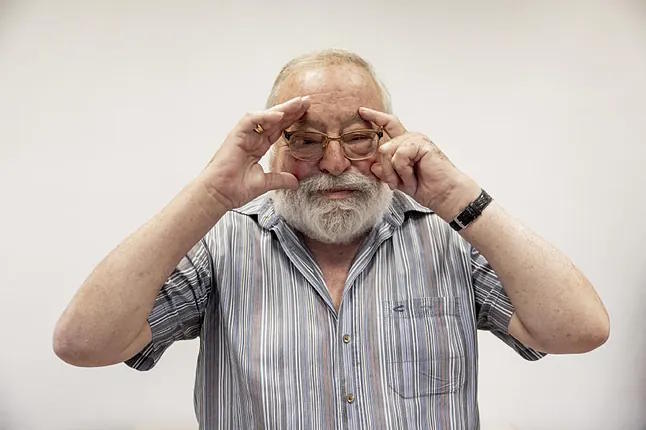How long have you been without teaching?
I retired 14 years ago.
Did you enjoy being a teacher?
I disliked what surrounded the classroom. Sometimes I wake up and think: everything hurts, I'm going to die, but I don't have a department meeting... I did enjoy teaching.
Did you address students informally or formally?
Informally. One of the first disciplinary proceedings opened against me was for using informal language with the students.
Were you a hot-tempered or humorous teacher?
Humorous, yes, a bit silly. Not hot-tempered. I have never been hot-tempered in life, but not in the classroom. And my colleagues complained: you get so angry with us and yet you are so nice to them.And as a student? I imagine you were mischievous and challenging.
I completed my degree when García Calvo was dismissed. Yes, I was quite... Quite subversive. I aimed to turn classes into a kind of open dialogue, without hierarchies. Those things... They give me goosebumps just thinking about it. On the other hand, I read and was a good student. Muñoz Alonso was my professor and nemesis, a bit twisted, but witty. When I acted that way, he would say, "Savater, you have an A grade, please leave the class."How did you deal with challenging students?
I believe I understood them. Well, I also had ETA members in class. They would speak in Basque, and then someone would translate for them, and that was it.
Now you are returning to teaching with a Master's in Humanities. I assume the hypothesis is that the Humanities are undervalued.
I'm not predicting doomsday either because, ultimately, the academic level of the sciences in Spain is still lower than that of the Humanities. The Master's program was born from seeing that around the College of Emeritus there is a group of very talented people who can come together to reintroduce a type of education that has influence and presence in life, from the everyday to politics... We have Darío Villanueva, Azúa, José Luis Pardo...How optimistic are you about the Humanities? Will there continue to be art historians?
My crystal ball is very foggy. But I don't think things are as bleak as they seem when looking at Trump and Gaza... Personally, I am pessimistic, but relatively optimistic socially.
Can I ask you about Gaza?
Go ahead.
Well then.
I believe the main culprit is Hamas, not Israel. I think pro-Palestinianism has become a substitute religion based on repeated but not reflected ideas. The Arab-Israeli conflict is extremely complex, and of course, Netanyahu is an abominable character who tarnishes Israel's reputation. Many Jewish friends also say the same. But I don't forget that Israelis are under the weight of terrorism.
But people see terrible images and news, and I suppose there is an instinct of goodness in saying "this hurts me."
Two things: who sends us those terrible images? People get informed with images from Hamas, who control the food, administer aid, and broadcast the information that suits them. Horrible things are happening, yes, and there is a civilian population held hostage by the terrorists who claim to represent them. We saw this in the Basque Country, where ETA members hid among the people... Secondly, we all feel compassion for the children of Gaza. But we need to understand how it got to that point, who manipulates whom.
So, I understand that the instinct of goodness is not enough. I ask you this as an Ethics professor.
No, because good feelings can be misused. Kindness and compassion are the basis of ethics and humanity, but they are not ethics. The great ethics masters, starting with Kant, write about this: we must defend ethics from good feelings because the danger is that ethics becomes self-satisfying sentimentalism.
Fernando, when you were 18, what was the alternative to Philosophy and Letters? What careers tempted you?
None. Look, in the revalidation exam, I got a 10 in Letters and a zero in Mathematics. The teachers didn't know what to do with me.
Were you that bad? Terrible. I have never met anyone so incapable. I used to go grocery shopping with a calculator until mobile phones came along. I just haven't been able to do anything other than what I do. I couldn't ride a bike, couldn't drink from a wine skin, couldn't drive...
Play billiards, table football?
Nothing, a disaster. I remember a friend tried to teach me how to drive, and we were unlucky to be stopped by the police while practicing in Ciudad Universitaria. Since I was known as an opponent of the dictatorship, they arrested me.
So, were university and teaching your main sources of income in life?
I have mainly lived off the university. When I started writing for El País, I had another significant source of income. But before that, what I earned from Triunfo and Informaciones was just enough to go out to dinner occasionally. It was more useful to impress the girls I liked than anything else.So, was writing for newspapers a coincidence in your life? Or not so much?
I have always written for newspapers, I even wrote for the school newspaper, the old Soy Pilarista. I directed it and discovered that everyone promises to write an article but never does. And of course, when the deadlines approached, I had to even write about roller hockey. My friends, teasing me, said that instead of Soy Pilarista, the newspaper should be called Soy Sabater.
The Last Question
What is the most impertinent question you have been asked? And how did you respond?
There are inappropriately flattering questions that treat you like a wise person who understands everything when, look, I manage as best as I can, I have no special magic.
